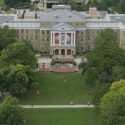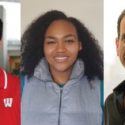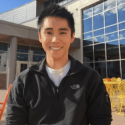Chancellor’s awards honor undergraduates for outstanding research, public service, scholarship
More than 150 students were honored May 1 during the Chancellor’s Undergraduate Awards Ceremony, an annual showcase of academic excellence, public service and outstanding undergraduate research at the University of Wisconsin–Madison.
A total of 103 students received Wisconsin Hilldale Undergraduate/Faculty Research Fellowships, which support undergraduate research done in collaboration with a faculty or staff member. To help offset research costs, the student receives $3,000 and the faculty or staff member $1,000.
Excavating stone tools
Hilldale winner Megan Bernards, a junior anthropology major from Reedsburg, Wisconsin, will use her award to travel to the Turkish island of Tenedos this summer to advance her study of lithic industries, or artifacts made of stone. With Professor William Aylward, she will participate in excavations and investigate how early inhabits of the small but important island utilized stone tools relative to larger settlements, like Troy, on the neighboring mainland.
This will be her second foreign trip to an excavation site. She studied in South Africa during the summer of 2016.
“The Hilldale Award makes a trip like this more feasible and accessible for me,” she says. “And it’s nice to know that others are confident in my ability to conduct research.”
Fighting ‘fake news’
Junior Yogesh Balaje Mahendran, a computer engineering and computer science double-major from Kuwait, will use his Hilldale award to address what he calls “a modern plague” — the spread of fake news online.
“It’s one of our most prevailing problems, and it’s having a bad effect on society,” he says. “People are starting to lose their belief in actual news because they can’t tell the difference.”
Working with Assistant Professor Varun Jog, Mahendran will test three hypotheses. One, for instance, posits that there is a ratio where the number of positive and negative reader responses to a news article tips to the point where it could be flagged as likely false information.
“If we can identify that threshold, it could be used as the trigger for external intervention to prevent the proliferation of the false news,” Mahendran says.
Initiative and efficiency
Also at the ceremony, four students received Carleton and Mary Beth Holstrom Environmental Scholarships, 21 students were awarded Sophomore Research Fellowships, 20 students earned University Book Store Academic Excellence Awards, and two seniors won Theodore Herfurth and Teddy Kubly Awards for Initiative and Efficiency.
The ceremony honored recipients of many national scholarships as well, including Jordan Madden (Truman Scholarship), Phoenix Rice-Johnson (Marshall Scholarship), HaoYang “Carl” Jiang (Paul and Daisy Soros Fellowship for New Americans) and Fangdi Pan (Schwarzman Scholarship). Winners of Goldwater and Udall scholarships also were recognized.
View a full list of this year’s award recipients.
Students who give back to society
In addition, 25 students have been selected to receive Meyerhoff Undergraduate Excellence & Ginsberg Family Awards, which recognize outstanding students for their leadership, service and scholarship. That ceremony will take place May 4. View the list of Meyerhoff/Ginsberg winners.
Previously, the awards bore only the Meyerhoff name. As the funding arrangement with the Meyerhoff family reaches its end, the awards will be known going forward as the Ginsberg Family Awards.
The Ginsberg family has chosen to offer these awards in honor of Paul Ginsberg, who served as UW–Madison dean of students from 1970 to 1987. Ginsberg, who died three years ago at age 90, kept in close contact with current Dean of Students Lori Berquam, whom he considered “a kindred spirit,” according to Larry Ginsberg, one of three Ginsberg children.
“In talking with Lori about our father’s legacy, we knew he would love the idea of continuing to provide benefits to students at the university, especially any benefit that helps students who want to give back to society as a whole and to those less fortunate in particular,” Larry Ginsberg says.
His father believed in and tried to instill in others the “one-pot theory” — that whatever we have, we share.
“This isn’t about keeping his name alive — he wouldn’t have cared about that,” Larry Ginsberg says. “It’s about bettering the lives of students. He loved the dean’s office, but mostly he loved bridging the gap between a student and the university. He absolutely loved and valued most being able to ‘humanize’ the university experience for a student.”
Tags: student awards, students



